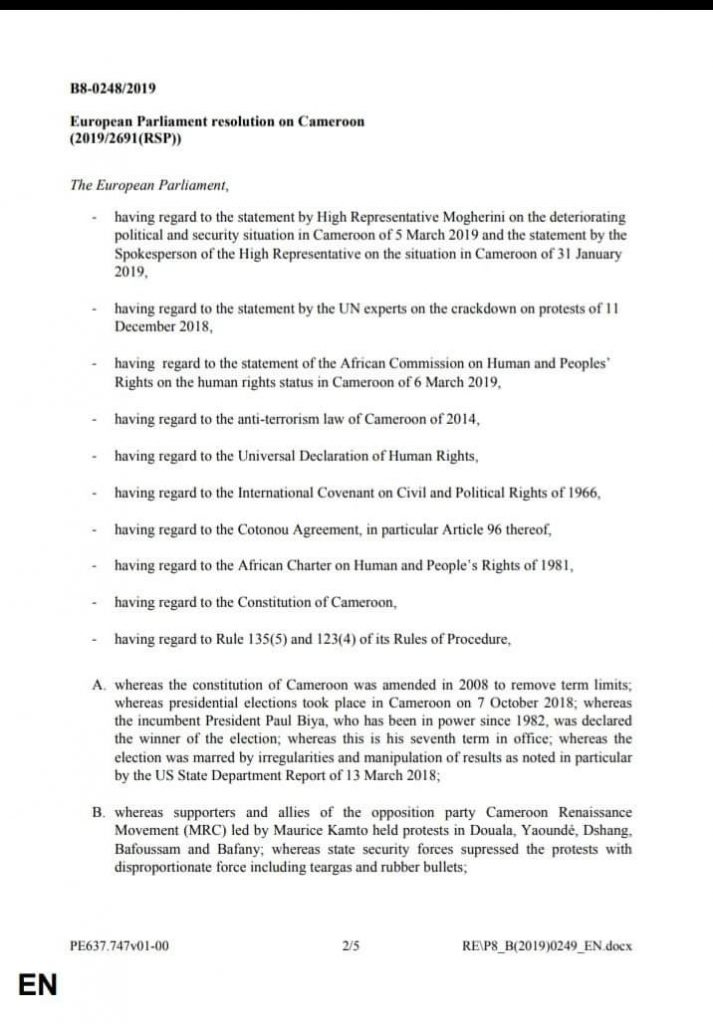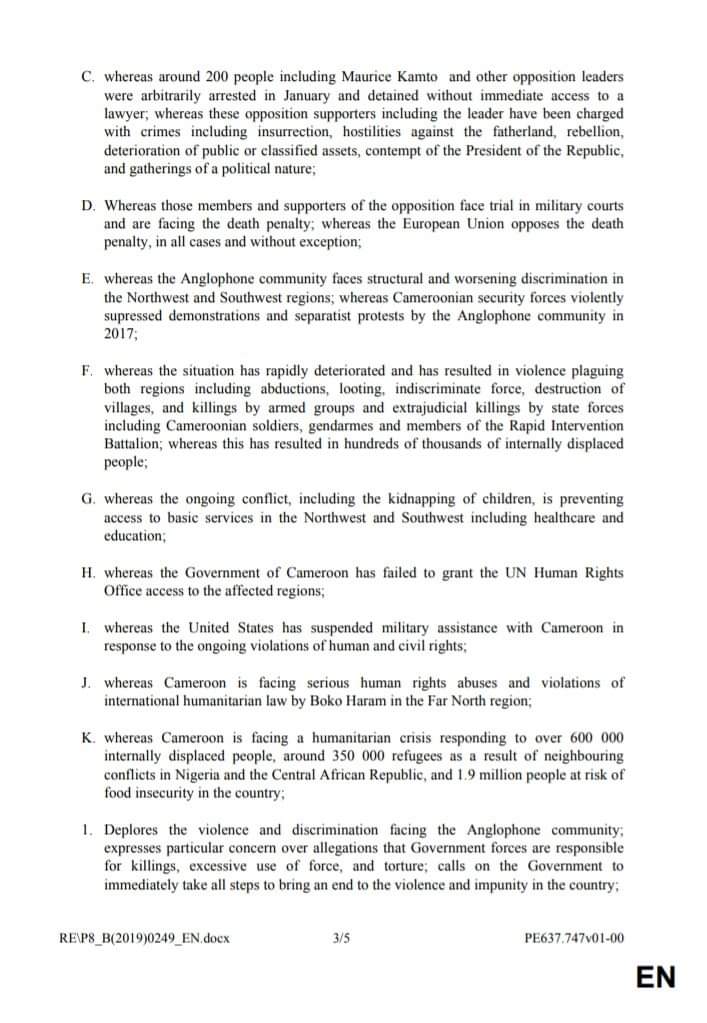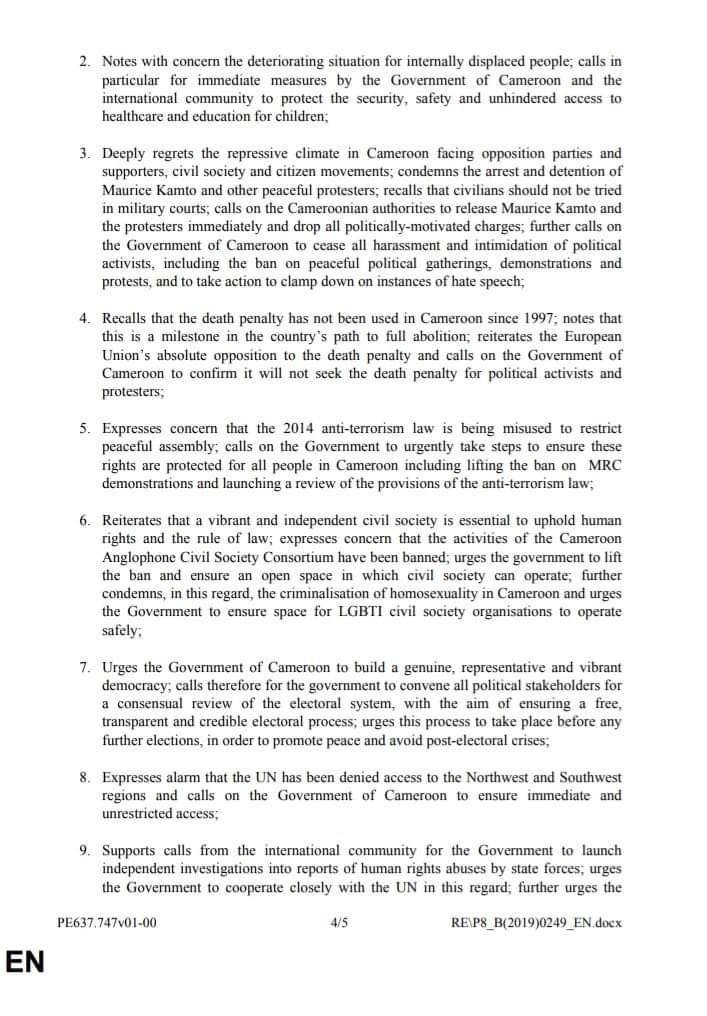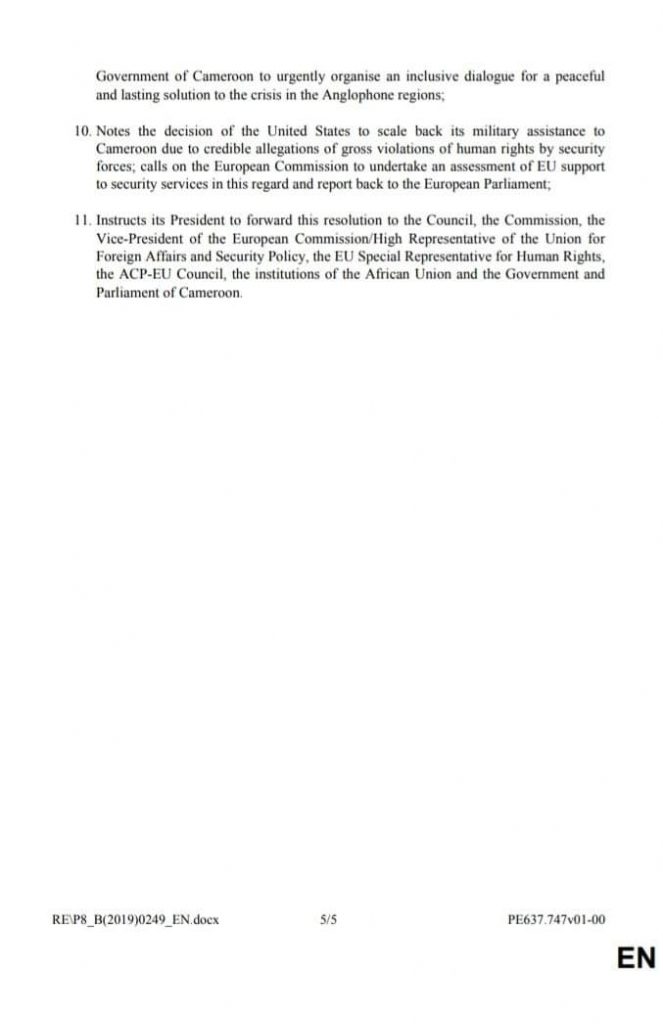The European Union Motions Discussion Of Armed Conflict In Cameroon On UN Security Council

Members of the European Union have called for an immediate action to solve the ongoing armed conflict in Southern Cameroons, expressing deep concerns on the deteriorating situation . The EU has said, discussion of the ongoing war should be included on the agenda of UN Security Council.
European Parliament Resolution on Cameroon
(2019/2691(RSP))
The European Parliament,
– having regard to the Declaration by the High Representative of the European Union, Federica Mogherini, on behalf of the EU, on the deteriorating political and security situation in Cameroon of 5 March 2019,
– having regard to the Statements by the Spokesperson of the European External Action Service (EEAS) on the situation in Cameroon of 31 January 2019, 25 October 2018, 28 September 2018 and 30 September 2017,
– having regard to the statement by the Chair of the European Parliament Subcommittee on Human Rights, Antonio Panzeri, from 7 March 2019 on the situation in Cameroon,
– having regard to the Preliminary Statement of the African Union Election Observation Mission to the 7 October 2018 Presidential Election in the Republic of Cameroon of 9 October 2018,
– having regard to the African Charter of Human and Peoples’ Rights of June 1981,
– having regard to the Universal Declaration of Human Rights of December 1948,
– having regards to the International Covenant of Civil and Political Rights of 1966,
– having regard to the ACP-EU Partnership Agreement (‘Cotonou Agreement’),
– having regard to Rule 135 of its Rules of Procedure,
Whereas since the presidential election on October 7, 2018, Cameroon is experiencing a wave of demonstrations challenging the re-election of President Biya, as well as repression of all forms of peaceful protests, resulting in multiple arrests, including that of Cameroonian opposition leader and presidential candidate, Mr. Maurice Kamto, and some of his closest collaborators,
Whereas up to 200 opposition members or supporters were arrested since January 2019 and opposition meetings banned from 6 to 13 April,
Whereas Cameroonian authorities instigated disproportionate military trials against opposition members on state security charges, exacerbating the political unrest in Cameroon; whereas the accused, if convicted, could face the death penalty,
Whereas during demonstrations, the police used excessive force and fired live rounds on protestors,
Whereas Cameroon faces serious security challenges in Anglophone western Cameroon and in regions neighbouring Nigeria due to activities from the radical islamist terror organisation Boko Haram,
Whereas in late 2016, the imposition of French laws and language in their courts and classrooms and the discrimination against and relative neglect of the anglophone regions, resulted in peaceful strikes of teachers and lawyers as well as peaceful demonstrations in the Anglophone regions,
Whereas the peaceful demonstrations were violently repressed by the security forces and the internet was banned locally for three months; whereas this led to a separatist declaration in October 2017
Whereas violence has escalated since October 2018, with the security forces conducting large-scale operations, often abusive and leading to human rights violations, including unlawful killings, rape, violence against women and children, and destruction of property, and the separatists conducting kidnappings, hit-and-run attacks and enforcing weekly ghost-towns and boycotts of schools,
Whereas according to human rights organisations at least 170 civilians have been killed since October 2018 in fighting in English-speaking western Cameroon between separatists and government forces
Whereas security force violence has been directed against medical facilities and health workers,
Whereas in order to enforce boycotts of schools, separatist groups attacked and burned dozens of schools, threatened teachers, students and parents, kidnapped principals and students and violently attacked teachers and students,
Whereas the crisis also led to massive displacement, with more than half a million people displaced and to a standstill of the economy of the Anglophone region due to fears of repression,
Whereas the emergence of hate speech based on ethnicity by some of the media and political actors, including recently a member of the government, is an additional cause for concern,
Whereas freedoms of expression, association and peaceful assembly are restricted throughout the country and the English speaking part of the population has repeatedly made claims that there is a lack of equal representation for the English speaking population; whereas civil society activists, journalists, trade unionists and teachers have been arrested and some face trial before military courts,
Whereas Boko Haram continues to commit serious human rights abuses and violations of international humanitarian law in the Far North region, including looting and destroying properties and killing and abducting civilians, whereas it leads to large numbers of displaced people, whereas Cameroon has 370,000 refugees of which 100,000 are Nigerians
Whereas in response, the authorities and security forces committed human rights violations and crimes under international law, including arbitrary arrests, incommunicado detentions, torture and deaths in custody,
Whereas the forestry sector is of considerable importance in Cameroon which is a high-end beneficiary of the EU’s Forest Law Enforcement, Governance and Trade (FLEGT) action plan; whereas illegal logging is widespread due to weak regulation and corruption,
Whereas while the action plan and its Voluntary Partnership Agreement (VPA) have strengthened civil society and increased transparency, a legal timber-licensing scheme still remains to be established,
Expresses its serious concerns on the high degree of instability in Cameroon due to the persistence of several crises in parallel,
Deplores the loss of lives during demonstrations during the last months and expresses sympathy to the families of the victims; condemns the human rights violations and attacks committed by Cameroonian security forces on demonstrators and strongly defends the right of Cameroonians to peacefully demonstrate,
Condemns the crackdown operated by Cameroon authorities on peaceful demonstrators and members of the opposition,
Calls in particular on Cameroonian security forces to exert utmost restraint vis-à-vis peaceful demonstrators,
Demands the armed separatist leaders to immediately direct their fighters and followers to halt all human rights abuses and to stop interfering with children’s education,
Urges the Government of Cameroon to free all those arrested solely on politically motivated charges, among which opposition leader Maurice Kamto and permit protests to go forward,
Calls for investigating and punishing police violence,
Is highly worried by the ongoing violence in Cameroon’s Anglophone regions; condemns the use of force against civilians both by the Cameroon security forces and the separatists and calls for an immediate cease-fire, with a special focus on the immediate end to attacks on medical facilities and personnel and extra judicial killings,
Is worried by the Cameroonian government’s failure to hold its security forces to account, which has only encouraged abusive units to commit more crimes; requests the security forces to carry out operations by respecting international human rights law,
Calls on both the government and the Anglophone separatists to seriously consider supporting the project of an Anglophone General Conference initiated by religious leaders in order to organise an inclusive national dialogue on the conflict in the Anglophone region and possible solutions to the longstanding grievances; calls upon the international community to help facilitate an inclusive national peace dialogue by offering a mediating role,
Regrets the absence of will from both conflict parties to engage into peace talks; urges the African Union (AU) to push for the organisation of such talks and calls on the EU to stand ready for supporting this process; considers that in the absence of progress, the crisis in the Anglophone regions should be put on the action agenda of the United Nations Security Council,
Calls on the Cameroonian authorities to ensure accountability for human rights violations by the security forces and to conduct prompt, thorough, independent and impartial investigations into all allegations of human rights violations,
Calls for the immediate liberation of unlawfully detained civilians and an immediate end to the use of military trials for civilians and francophone courts for Anglophone detainees,
Requests an immediate end to the practice of incarceration of convicted civilians in prisons far away from their families, on which prisoners in Cameroon have to rely for medical care and food,
Asks the Office of the High Commissioner for Human Rights (OHCHR) or relevant UN experts to conduct a fact-finding mission into allegations of human rights abuses in Cameroon,
Welcomes that the forest action plan and its Voluntary Partnership Agreement (VPA) have strengthened civil society and increased transparency; considers however that illegal logging remains a serious issue in Cameroon and encourages Cameroon to establish a legal timber-licensing scheme and to fight against corruption in the forestry sector,
Instructs its President to forward this resolution to the Vice-President of the Commission/High Representative of the Union for Foreign Affairs and Security Policy, the Council, the Commission, the governments and parliaments of the Member States, the European External Action Service, the Government and Parliament of Cameroon, the African Union, the Pan-African Parliament and the ACP-EU Joint Parliamentary Assembly.








